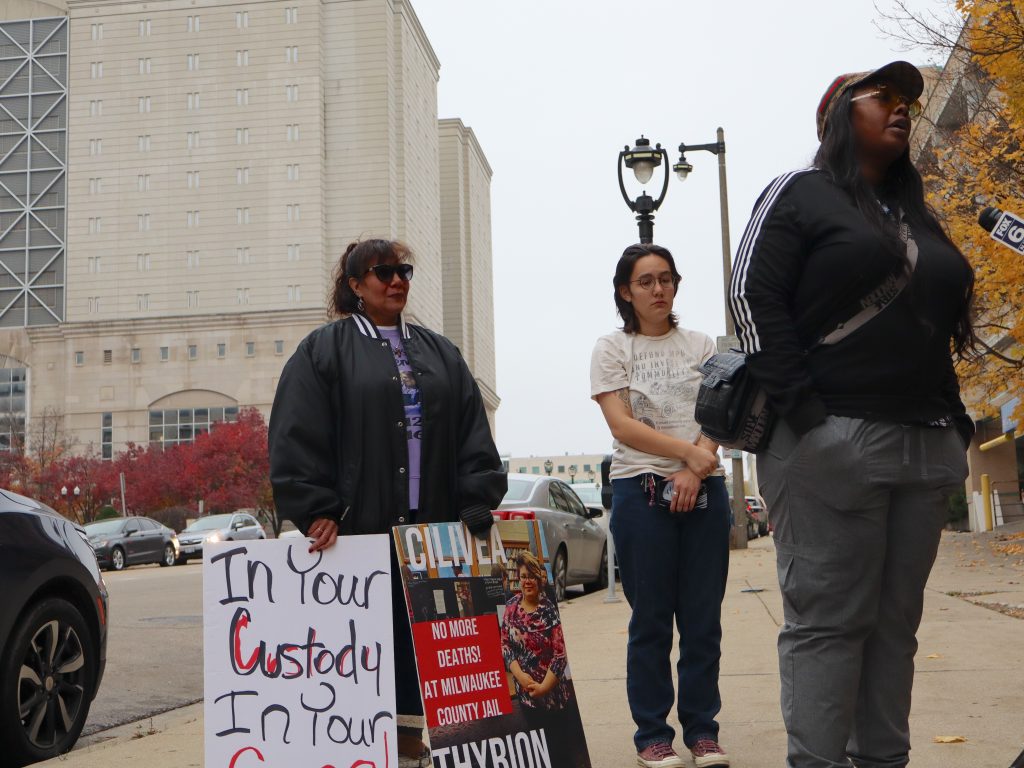Activists, Family Members Call For Change At Jail
Calling for community input after 'deeply alarming' report on jail's suicide policies.

(Left to right) Kerrie Hirte, Casey Serrano and Laquita Dunlap. Photo taken Nov. 25, 2024 by Graham Kilmer.
A recent audit of the Milwaukee County Jail, which found serious problems with the facility’s suicide watch policies, is being criticized by local activists for lacking community input.
The audit was conducted by Texas-based Creative Corrections, LLC and the report was released to county policymakers on Nov. 20. It documented “deeply alarming” policies for suicide prevention, inefficient use of mental health resources, insufficient training, understaffing, overcrowding and a lack of internal oversight.
The Milwaukee Alliance Against Racist and Political Repression held a press conference Monday morning with family members of people who have died in the jail, arguing, among other things, that the audit should have provided an opportunity for local community members to weigh in on the issues discovered during the audit.
“From the beginning, we have demanded substantial community input,” the organization said in a statement Monday morning before the press conference. “Incarcerated individuals, formerly incarcerated Milwaukeeans, and their loved ones deserve input on the audit.”
Now that the report has been finalized, community members should be given the opportunity to weigh in on solutions, said Casey Serrano, a representative of the alliance. For example, the group would argue the solution to problems like overcrowding and understaffing is to provide more support for people outside of the jail, and to lower the rate of incarceration, Serrano said.
Kerrie Hirte, mother of Cilivea Sunray Thyrion, and Laquita Dunlap, mother of Brieon Green, joined the press conference Monday and called for better mental health screening and suicide prevention policies in the jail. Both lost children to suicide in the facility, and both mothers expressed hope that the jail can be improved for the sake of families with loved ones now being held there.
Green was 21-years old when he committed suicide in the jail less than 30 minutes after being booked into the Milwaukee County Jail in 2022. He had been detained at the jail during the prior month and placed on suicide watch, Dunlap said, arguing that jail staff should have identified him as someone struggling with mental health issues and kept him safe.
“My son deserves to be here,” Dunlap said. “And I still want accountability. I want justice.”
Hirte and Thyrion both said they believe the jail needs to do a better job of screening people for mental health challenges. Hirte’s daughter struggled with mental illness and, she said, should have been moved to a mental health facility. Her daughter had a history of suicidal thoughts and ingesting objects, and she died after ingesting a diaper while on suicide watch within the jail.
“So I feel that they need to pay attention to what’s happening on the outside of the jail before they’re putting people inside of the jail,” Hirte said.
If you think stories like this are important, become a member of Urban Milwaukee and help support real, independent journalism. Plus you get some cool added benefits.
MKE County
-
Fellow Judge Testifies in Dugan Case
 Dec 16th, 2025 by Graham Kilmer
Dec 16th, 2025 by Graham Kilmer
-
Key Questions in Dugan Trial Take Shape on First Day
 Dec 15th, 2025 by Graham Kilmer
Dec 15th, 2025 by Graham Kilmer
-
FTA Tells Milwaukee to Crack Down on Fare Evasion — Even Where Fares Don’t Exist
 Dec 12th, 2025 by Graham Kilmer
Dec 12th, 2025 by Graham Kilmer





















Jail suicide is a complex issue, even if we know what “they should” do. Several assumptions, not “should,” but “why” and “how,” about how to move forward to prevent them from happening in the future.
There are two reasons why existing systems will never successfully deal with this problem. Reason number one is that existing systems and cultures won’t change in ways that identify people at risk and get them to the right place. Reason number two is that jail systems – not just Milwaukee’s – will never be able to recruit and retain the clinical talent needed to identify and diagnose those at risk.
This leads to the big assumption, the one that bumps into two impediments. That assumption is that what is needed is an “affiliation” agreement with a hospital/medical school for health and mental health services. Jails are places that over time breed cynicism, especially the belief that “they” are all malingerers and fakers.
A rotation of clinicians, including residents, solves this problem if it is built around solid front-end screening and a process for getting those in need to the right place. The impediments: money, whatever you say about the current system, it is cheap; and finding a high-quality institution willing to take on this responsibility.
The alternative to that strategy: more of the samet, with predictable results, regardless of what “they should do.”